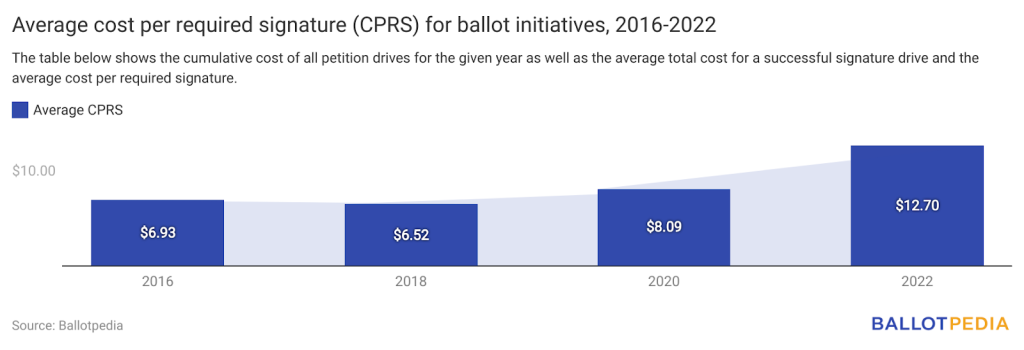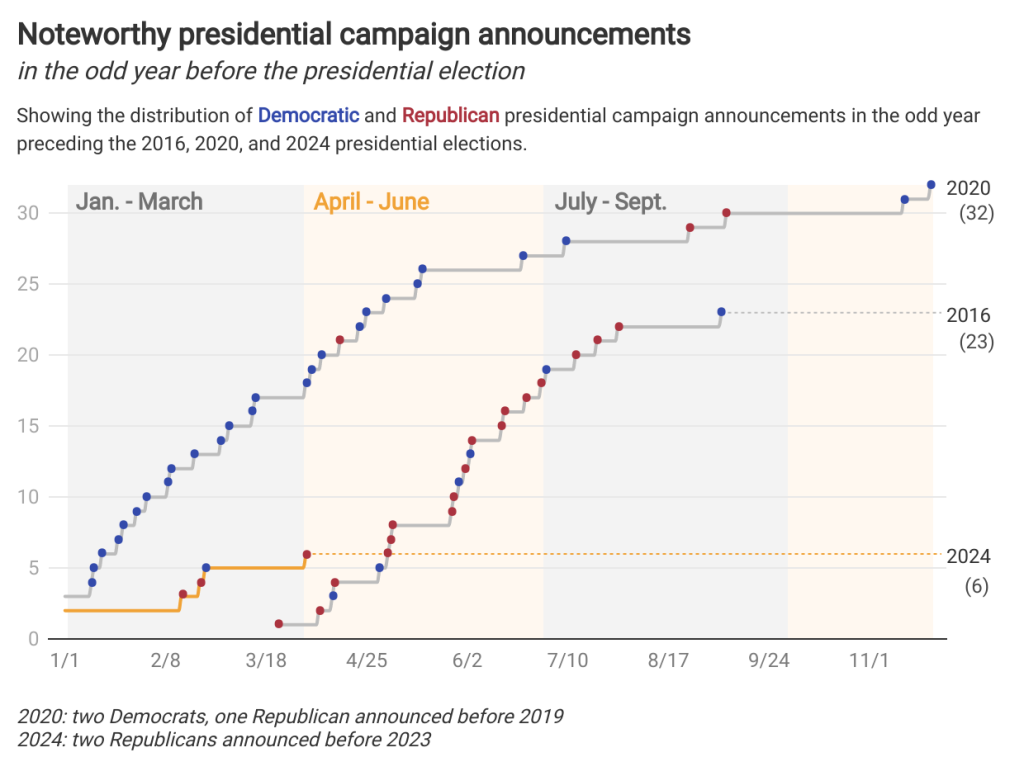Welcome to the Friday, April 14, Brew.
Here’s what’s in store for you as you start your day:
- Ballot initiative signature campaign costs increased nearly 300% over the past four elections
- DNC announces Chicago as host city for 2024 Democratic National Convention, RNC announces Fox News will host first Republican primary debate
- #FridayTrivia: How many times has Congress successfully overridden a presidential veto since 2008?
Ballot initiative signature campaign costs increased nearly 300% over the past four elections
In 2022, the average cost of running a successful petition drive was $4.1 million, double the 2020 average cost of $2.1 million. Thirty initiatives were on the ballot in 2022. Since 2016, the average cost of a petition drive has increased almost 300%, while the number of citizen initiatives that qualified for the ballot decreased 61%. We calculate the cost-per-required-signature (CPRS) using campaign finance records for campaigns along with the number of signatures that were turned in to qualify a measure for the ballot.
The average cost of an individual signature rose to $12.70 in 2022, up from $8.09 in 2020, $6.52 in 2018, and $6.93 in 2016. The total amount spent on initiative petition drives increased 36% over 2020, with $118.3 million spent on signature drives for 29 ballot initiatives in 2022 versus $87.2 million spent on 43 initiatives in 2020.

Higher signature costs were expected in 2022 after ballot campaigns said they faced labor shortages and ongoing COVID-19 restrictions.
- Arizona Proposition 209, an initiative to set a limit on interest rates for debt accrued from receiving healthcare services, had the highest CPRS at $25.44. Sponsors of the measure, Arizonans Fed Up With Failing Healthcare, hired Fieldworks LLC to collect petition signatures. More than $6 million was spent collecting the 237,645 valid signatures required to put the measure on the ballot. Proposition 209 was approved 72.01% to 27.99%.
- California Proposition 27, an initiative that would have legalized online sports betting and dedicated revenue to combat homelessness in the state, had the most expensive signature drive at $18.8 million. Voters rejected Proposition 27 82.28% to 17.72%.
- A record-breaking $71.6 million was spent to qualify six California initiatives for the 2022 ballot. The average total cost for a successful petition drive in California last year was less than $12 million. In 2020, the average cost of a successful petition drive in California was $4.4 million.
- Massachusetts Question 4, Remove Proof of Citizenship or Immigration Status for Driver's License Applications Referendum had the lowest CPRS at $0.08. Question 4 was a veto referendum on House Bill 4805 (H 4805). H 4805 repealed a provision of state law that says, "No license of any type may be issued to any person who does not have lawful presence in the United States."
Click below to read more about our cost-per-required-signature report.
DNC announces Chicago as host city for 2024 Democratic National Convention, RNC announces Fox News will host first Republican primary debate
Candidates continue to jump into the 2024 presidential race—though not at the pace we saw in 2020. As of today, six noteworthy candidates have declared their candidacy for the 2024 presidential election, including one Democrat and five Republicans. Additionally, on April 12, U.S. Senator Tim Scott (R-S.C.) announced he was exploring a run for president.
Below is a summary of each candidate’s campaign activity from April 7 to April 14.
- Author and 2020 presidential candidate Marianne Williamson (D) spoke at an event hosted by the Yale Political Union on April 11. She is also beginning a campaign tour of New Hampshire today, and will appear across the state through April 17.
- Former U.N. Ambassador Nikki Haley (R) campaigned in Iowa from April 10 to April 12. She held her first Women for Nikki campaign event in Des Moines on April 12.
- Former Arkansas Governor Asa Hutchinson (R) is campaigning in Iowa today and tomorrow, his first campaign stop in the state since announcing his candidacy on April 2.
- Entrepreneur and author Vivek Ramaswamy (R) campaigned in New Hampshire on April 13. He’s set to continue campaigning across the state through April 17.
- Former President Donald Trump (R) will appear today at the National Rifle Association conference in Indianapolis. Rep. Cory Mills (R-Fla.) endorsed Trump on April 10, bringing the total U.S. House endorsements we have tracked for his campaign to 39.
- Ballotpedia did not identify any campaign activity from former Montana Secretary of State Corey Stapleton (R).
The Democratic National Committee (DNC) and Republican National Committee (RNC) also made major announcements about the presidential election this week.
- The DNC announced it will hold the 2024 Democratic National Convention in Chicago, Illinois.
- RNC Chairwoman Ronna McDaniel announced that Fox News will be hosting the first Republican primary debate. The RNC has previously announced the debate will take place in Milwaukee, Wisconsin, in August 2023.
At this point in the 2020 cycle, 20 noteworthy candidates were running for president. Nineteen were seeking the Democratic nomination, and one (Trump) was seeking the Republican nomination.

Looking back at the previous two election cycles:
- 2020: Notable stories at that time included Rep. Eric Swalwell (D-Calif.) announcing his presidential campaign on April 9, 2019, and former Rep. Tulsi Gabbard (D-Hawaii) reaching the fundraising threshold to qualify for the first Democratic primary debate on April 11. Swalwell would drop out of the race on July 8, 2019. Before Gabbard dropped out of the race on March 10, 2020, she received two pledged delegates from American Samoa, where she received 29.3% of the primary vote.
- 2016: In the 2016 election cycle, four noteworthy candidates had announced their campaigns as of April 14, 2015. There was one Democrat, the eventual 2016 nominee Hillary Clinton (D), and three Republicans, Sens. Ted Cruz (R-Texas), Rand Paul (R-Ky.), and Marco Rubio (R-Fla.). At this point in the 2016 cycle, media outlets reported on Clinton hiring Troy Price as her campaign’s Iowa political director on April 8, 2015, and the release of Clinton’s campaign mission statement. Trump, the eventual Republican nominee, also spoke at the National Rifle association annual conference on April 10, where he said, “If I run, and people are going to be very surprised, and if I win, America will be great again.”
Click below to read more about the 2024 presidential election.
#FridayTrivia: How many times has Congress successfully overridden a presidential veto since 2008?
In the Wednesday Brew, we discussed President Joe Biden’s (D) April 6 veto of House Joint Resolution 27—the second veto of his presidency. The House had voted 227-198 to approve the resolution, while the Senate had approved it in a 53-43 vote.
Since 1981, President Ronald Reagan (R) has issued the most vetoes with 87. With only two vetoes, Biden has issued the fewest, followed by President Donald Trump (R) with nine.
Congress can override a presidential veto with a two-thirds majority vote in both chambers.
Since 2008, how many times has Congress successfully overridden a presidential veto?


